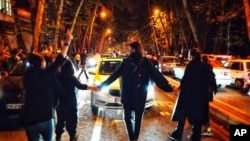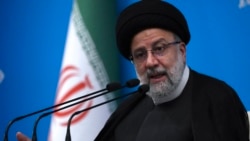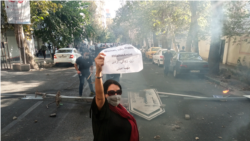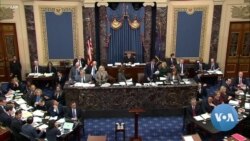International rights activists tell VOA that their counterparts in Iran are preparing to mark Saturday's first anniversary of the death in police custody of women's rights icon Mahsa Amini with new protests in defiance of Tehran's preemptive crackdown on peaceful dissent.
Amini was a 22-year-old Iranian Kurdish woman who was arrested by the Islamist nation's morality police in Tehran last September for allegedly not wearing her hijab in accordance with Islamist rules. She died in custody three days later.
Her death, following what witnesses said was a physical assault perpetrated by authorities, triggered months of mostly peaceful nationwide protests that posed the greatest challenge yet to the 44-year rule of Iran's ruling Shiite clerics.
"Iranian women have told us that they will continue the fight despite the government's futile attempts to silence them," said Skylar Thompson, global advocacy director for U.S.-based nonprofit group Human Rights Activists in Iran.
"I don't believe the Iranian government's preemptive arrests, fueled by a fear of Iranians returning to the street, are going to preempt renewed protests," added Thompson while speaking on VOA's Flashpoint Iran podcast this week.
Iran's Islamist rulers suppressed the protests that began in September 2022 with a violent crackdown that the U.N. special rapporteur on the situation of human rights in Iran said killed at least 520 people including 71 children. Authorities acknowledged incarcerating 22,000 others.
Iranian President Ebrahim Raisi told U.S. network NBC in an interview that aired Tuesday that Iranians would pay another "big cost" if they tried to revive nationwide protests in the coming days.
Masih Alinejad, TV host of VOA Persian's Tablet program, told last week's Flashpoint Iran podcast that she has received videos from audience members in Iran showing women distributing pamphlets that urge people to gather publicly for the Mahsa Amini anniversary.
"I see that Iranians are ready and telling each other: 'Let's get back to the street. We have to end this regime, otherwise the regime will end each of us,'" Alinejad said.
Amini's father, Amjad, who lives in her hometown of Saqqez in northwestern Iran's Kurdistan province, told VOA Persian in an interview published September 6 that his family was organizing a ceremony to honor his daughter's memory.
Three days later, Amjad Amini posted a photo of her on Instagram and said there would be a traditional religious ceremony at her grave in Saqqez. He also urged people to eschew violence.
Several news sources deemed credible by VOA Persian reported Tuesday that intelligence agents in Saqqez summoned Amjad Amini for questioning and were pressuring his family to keep quiet.
Asked by a VOA Persian journalist to respond to those reports, U.S. State Department spokesman Matthew Miller told a Thursday briefing that U.S. officials have information indicating Amjad Amini has been summoned for questioning four times in the past two weeks.
"The regime cannot intimidate the people of Iran into silence," Miller said. "The world is watching its treatment of these families and the ongoing intimidation of journalists and abuse of peaceful protesters, and we will continue to watch it closely and take whatever steps are appropriate to respond to it."
Relatives of other people killed in last year's protests have told VOA Persian that intelligence agencies have warned them to avoid public places on Saturday's anniversary.
An Independent International Fact-Finding Mission authorized by the United Nations Human Rights Council to investigate Iran's suppression of the protests that began last September issued a statement Thursday saying that one year later, Iranian government harassment of women and girls is on the rise.
"Authorities are exacerbating punitive measures against those exercising their fundamental rights, including freedom of religion, freedom of expression and peaceful assembly," the fact-finding mission said.
One protester wounded in last year's crackdown made a bold prediction to VOA Persian about the ability of Iranians to overcome authorities' latest efforts to deter new protests.
Kian Derakhshan was chanting protest slogans on the first day of last year's protests in Saqqez when security forces opened fire and peppered him with bullets, leaving him needing multiple surgeries. In a September 7 interview from exile in Iraq, he said: "I am sure we will win and establish freedom and democracy in Iran."
U.S.-based exiled Iranian crown prince Reza Pahlavi told VOA Persian while attending a Wednesday event in Washington that he sees Iranians coming together around a national goal that is not specific to one ethnic group or region of the country.
"If you look carefully, you will see that everyone in Iran welcomed the 'Woman Life Freedom' movement," Pahlavi said. "Men in universities chanted, 'Woman Life Freedom,' and female students chanted, 'Man Homeland Prosperity.' That means they have unity."
This story was a collaboration with VOA's Persian Service. Guita Aryan, Manouchehr Pordel, Rozita Irandoost contributed to this report.








